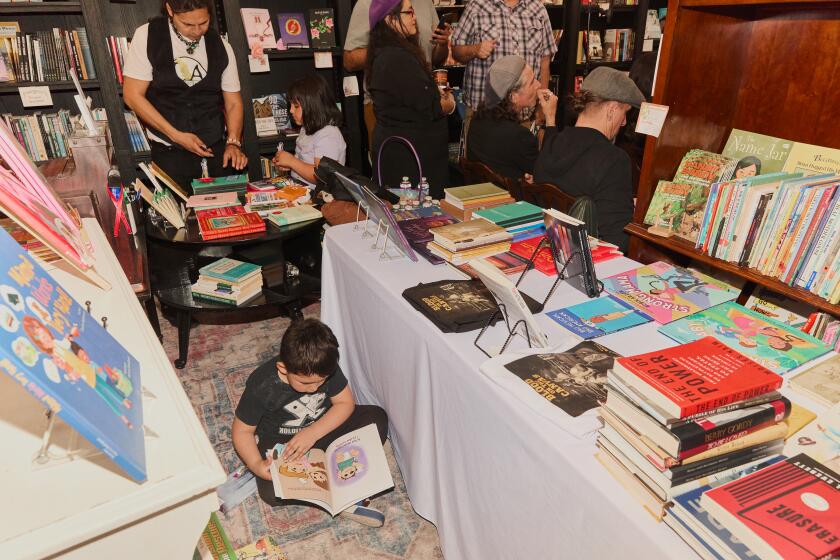Big book prizes -- the velvet salesmen
Fame, said Jack Kerouac, “is like an old newspaper blowing down Bleeker Street.”
Winning a major literary prize, on the other hand, is something you can cite on a book jacket. That’s why the pulses of publishers, editors, agents -- and authors less mordant than the bardic Beat -- quicken this time of year, as the award season slips into high gear.
Last week, the Swedish Academy named Hungary’s Imre Kertesz as the 2002 Nobel laureate in literature. On Thursday, the short lists of nominees for this year’s National Book Awards in fiction, nonfiction, poetry and young people’s literature were announced in New York. The Mann Booker Prize winner will be named in London on Tuesday. The National Book Critics Circle hands out its annual awards in March and the Pulitzers follow a month later.
Aside from their inherent drama and publicity value, do these prizes really make a difference to the world of letters?
Yes, say leading literary professionals, who believe such awards not only carry commercial weight, but also play an increasingly important role in connecting serious writers with readers eager for qualitative road signs in a world awash in books.
“There’s absolutely no question that the prizes make a huge difference and that awards absolutely translate into sales,” said publisher Morgan Entrekin, whose Grove/Atlantic is one of the country’s major independent literary presses.
“Just being nominated for one of these prizes affords a kind of indelible seal of legitimacy, especially for a work of fiction,” literary agent Sandra Dijkstra said. “Whether that seal is ersatz or real in terms of quality is always debatable, of course. But it’s still indelible.”
Entrekin said that his eight years at Grove/Atlantic have provided one example after another of the prize’s particular value to serious, literary authors. “When I had just taken over in 1994,” he recalled, “we were in the process of repackaging our backlist and the question arose of what we should do with the Japanese writer Kenzaburo Oe. I said, ‘Let’s do 3,000 copies, which will give us about four or five years of inventory the way he sells.’
“Ten days after the books came off the press, he won the Nobel and we were his only English-language publisher. He went from selling about 700 books a year to 60,000. Now, for one of the big conglomerates, that wouldn’t be like getting a new John Grisham, but for a literary publisher, like us, that’s a big deal. I’d love to have Kertesz right now.”
Both Dijkstra and Entrekin agree that, for the moment, the National Book Awards, the Pulitzers and the National Book Critics Circle exert the strongest pull on readers, and that England’s Booker is coming on strong among Americans, though the competition is open only to British, Irish and Commonwealth writers.
“We published Charles Frazier’s ‘Cold Mountain,’ ” Entrekin said, “and it was No. 1 on the bestseller lists, when it won the National Book Award. I’m sure we sold another 200,000 or 300,000 copies in hardback because of the award.”
The Booker’s nationally televised awards ceremony has helped give it the special cachet of a literary Oscar, and England’s legal bookmakers do a substantial business in wagers on the prize. Thursday, when the official Booker Web site mistakenly posted a draft press release listing Canadian Yann Martel as this year’s winner, bookmaker William Hill was flooded with so many big bets that it had to close the book until officials straightened out the mess. Wagering has now resumed, and this year’s odds-on favorite is 74-year-old Irish author William Trevor.
Dijkstra includes the National Book Critics Circle in what she calls “the golden ring that creates an enthusiasm factor in a book’s life.” Still, she said, “the Booker is having more and more of an effect here. Many of my friends buy the whole Booker short list because it’s a wonderful way to tip one off to quality fiction. This year’s list is particularly interesting because of all the Canadian writers [including Rohin Mistry and Carole Shields] and the lack of a single English writer. It’s another example of something you see around the world -- the colonial tail wagging the cultural dog.”
As an example of the Booker’s increasing American impact, Entrekin recalled Grove/Atlantic’s experience with Trezza Azzopardi, who was short-listed for the prize two years ago. “Her novel, ‘The Hiding Place,’ is about the Maltese immigrant community in Cardiff, Wales--not exactly a quick easy U.S. sale,” Entrekin said. “When it made the short list, literary editors assigned reviews. They were raves, and that made all the difference. We sold 40,000 copies in hardback and 50,000 in paper. So, just being short-listed gave us a way to find an audience for that worthy writer.”
According to Dijkstra, a place on the National Book Awards’ short list can have a similar impact. “When my client Amy Tan’s ‘The Joy Luck Club’ was nominated for a National Book Award, I was in New York for the ceremony. That morning, Amy, her mother and I were having breakfast at the Plaza Hotel, and I told her, ‘You’ve already won. The final vote doesn’t even matter. Just being selected for the short list is a victory.’ She didn’t win that year; there are now more than 4 million copies of ‘The Joy Luck Club’ in print in this country alone.
“There’s no way to quantify in advance what a reputation brings,” Dijkstra said. “That’s where these nominations and prizes come in.”
Sometimes, calculations about a prize’s value elude even the most astute literary publishers. One editor, who asked not to be named, was working at Farrar Straus & Giroux in 1988, when Egyptian novelist Naguib Mahfouz won the Nobel Prize.
His English-language publisher, the American University Press of Cairo, knew it lacked the means to market the new laureate in the United States, so it offered the right of first refusal to Farrar Straus & Giroux, which publishes more Nobel winners than any other U.S. house. The list includes Isaac Bashevis Singer, Joseph Brodsky, Czeslaw Milosz, Nadine Gordimer, Seamus Heaney and Derek Walcott.
Founder and publisher Roger Straus Jr., asked the editor to take Mahfouz’s novels home over the weekend and return Monday with an opinion on whether to buy them.
“I did so,” the editor recalled, “and concluded that, in my opinion, Mahfouz was ill-served by his various translators. Second, while his importance to Arab-language literature was inarguable, the work was, formally speaking, not of the first rank.
“When I told Roger that, he looked hugely relieved and exclaimed, ‘Thank God! The last thing this house needs is another ill-selling Nobel Prize winner. The only one for whom getting that thing ever made a difference was Singer.’
“So, we turned Mahfouz away,” the editor said, “only to have him scooped up by an editor at Doubleday named Jacqueline Kennedy. She commissioned masterful new translations and compelling new cover designs and published him brilliantly and successfully in both hardcover and paper.”
*
Regarding Media runs Wednesday and Saturday. E-mail timothy.rutten@
latimes.com.
More to Read
Sign up for our Book Club newsletter
Get the latest news, events and more from the Los Angeles Times Book Club, and help us get L.A. reading and talking.
You may occasionally receive promotional content from the Los Angeles Times.




